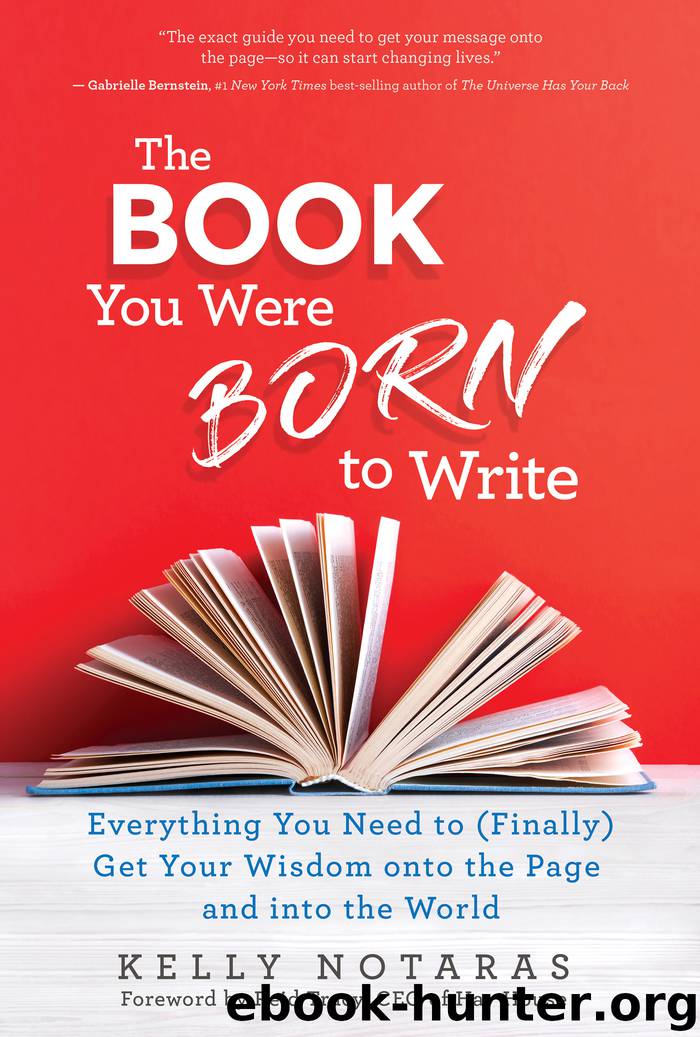The Book You Were Born to Write by Kelly Notaras

Author:Kelly Notaras
Language: eng
Format: epub
Publisher: Hay House
Published: 2018-11-12T16:00:00+00:00
Chapter 7
WORK WITH AN EDITOR
There’s a reason the incomparable Stephen King (yes, that Stephen King) remarks in his book On Writing that “to write is human, to edit is divine.” Editing, as I like to think of it, is the process by which we hire a second set of eyes to help us see our work the way our readers will see it—from a distance. No matter how good a writer you are, you’re going to be far too close to your book to be able to see it clearly on your own. Simply put, editorial support is critical to producing a successful book.
At first glance it may seem like this chapter is out of place in the writing process section of this book. It’s my experience that most people, even authors-to-be, think editing is something that only happens once a book is written and ready to go—and not a moment before. Not for nothing; certain types of editing really get going once a final manuscript is ready. But if there’s only one message you take away from this chapter, it’s that editors are much more than “finishers.” In fact, one of the most valuable times to use an editor is at the beginning of your book journey. You may be an expert in your occupation, in raising a family, in managing different types of illnesses, in supporting entrepreneurs to take their businesses to the next level—whatever good work it is that you do. But unless you’ve been working on books day in and day out over the course of many years, you are unlikely to be an expert on how to put a book or even a book proposal together. You’re unlikely to have spent hundreds of hours crafting saleable hooks, building outlines, developing story lines, and watching books in which you are heavily invested succeed—and fail. Professional book people have done all these things many times over. It’s our job to know what you don’t know about books, book ideas, book proposals, and book development. And—bonus—we also know a heck of a lot about polishing your prose until it shines like a beacon in the darkness. In the pages that follow, I’m going to explain all the different hats an editor wears; what types of editorial and writing support are available to you; how working with a pro can benefit you at any stage of your writing process—especially at the beginning; and how to find just the right collaborator for you and your book.
Download
This site does not store any files on its server. We only index and link to content provided by other sites. Please contact the content providers to delete copyright contents if any and email us, we'll remove relevant links or contents immediately.
Asking the Right Questions: A Guide to Critical Thinking by M. Neil Browne & Stuart M. Keeley(5755)
Autoboyography by Christina Lauren(5226)
Eat That Frog! by Brian Tracy(4519)
Dialogue by Robert McKee(4386)
Sticky Fingers by Joe Hagan(4188)
Journeys Out of the Body by Robert Monroe(3615)
Annapurna by Maurice Herzog(3464)
Full Circle by Michael Palin(3443)
Schaum's Quick Guide to Writing Great Short Stories by Margaret Lucke(3369)
Elements of Style 2017 by Richard De A'Morelli(3339)
The Art of Dramatic Writing: Its Basis in the Creative Interpretation of Human Motives by Egri Lajos(3058)
Atlas Obscura by Joshua Foer(2952)
Why I Write by George Orwell(2944)
The Diviners by Libba Bray(2927)
The Fight by Norman Mailer(2926)
In Patagonia by Bruce Chatwin(2919)
The Mental Game of Writing: How to Overcome Obstacles, Stay Creative and Productive, and Free Your Mind for Success by James Scott Bell(2897)
Venice by Jan Morris(2568)
The Elements of Style by William Strunk and E. B. White(2470)
